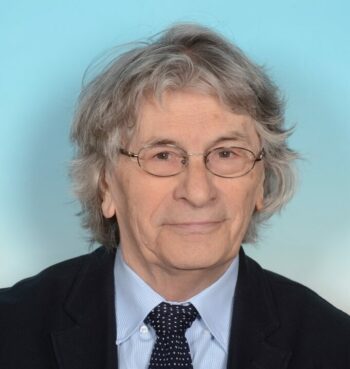Bourek Zlatko, F.C.A.

Born
- September 04, 1929, in Slavonska Požega
Deceased:
- May 11, 2018, in Zagreb
Bourek Zlatko, F.C.A.
Academic titles:
- Fellow of the Croatian Academy of Sciences and Arts
Membership in Academy:
- full member – Department of Fine Arts (05/20/2010 – 05/11/2018)
- associate member – Department of Fine Arts (05/16/2002 – 05/20/2010)
Zlatko Bourek, F.C.A., a prominent Croatian painter, sculptor, costume designer, set designer, director, author of cartoons and feature films, was born on September 4, 1929 in Požega, and spent his childhood in Osijek where he finished elementary and high school. From 1943 to 1945 he participated in the Antifascist Struggle. In 1955 he graduated sculpture and painting at the Academy of Applied Arts in Zagreb, with Prof. Kosta Angeli Radovani. While still studying with a group of like-minded people, he founded the Zagreb School of Animated Film, which brought a new concept to the making of animated films and gained a worldwide reputation. He first exhibited graphic works in 1959 and began exhibiting his first paintings in 1963. They already have the main features of his artistic creativity: grotesque humour with surrealist elements associated with folklore components.
Zlatko Bourek was the set designer of the world-famous series of animated films Professor Balthazar, realized from 1967 to 1978, in which, following the example of Rijeka, he visually designed the location of Balthazar-city.
Među posljednjim djelima akademika Zlatka Boureka izdvajaju se režija, kostimografija i scenografija za predstavu Kralj Ubu Alfreda Jarryja na 51. splitskom ljetu 2005. a 2010. je u Zagrebačkom kazalištu lutaka postavio lutkarsku predstavu za odrasle Jedini neuspjeh Adolfa H, autora Georgea Taboria za koju je radio scenarij, režiju i nacrt za lutke. Na savskom nasipu u Zagrebu 2016. je postavio skulpturu Međaš protiv uroka i poplave.
He started cartooning as a background cartoonist and achieved his first success with Cowboy Jimmy (1957), followed by the films Happy End (1958), Inspektor se vraća kući and Kod fotografa (1959). Since 1960 he has made cartoons based on his own scripts, among which are Kovačev šegrt, I videl sem daljine meglene i kalne, Bećarac, Kapetan Arbanas Marko, Mačka, Školovanje and Ručak. As a director and screenwriter, he made three feature films: Circus Rex, Little Red Riding Hood, Ventriloquist.
Since 1971 he has collaborated as a set and costume designer with reputable theatres in Germany, and since 1988 he has been a permanent member of the Hans Wurst Nachfahren Theatre in Berlin. At the Dubrovnik Summer Festival in 1977 he directed the puppet farce Orlando maleroso by Salih Isaac, which began the renewal of puppet stage expression in Croatia and achieved enormous success in the country and at the world’s largest theatre festivals with the puppet play Hamlet performed by the ITD Theatre from 1982.
Among the last works of academician Zlatko Bourek are the direction, costume design and set design for Alfred Jarry’s King Ubu at the 51st Split Summer 2005, and in 2010 he staged a puppet show for adults at the Zagreb Puppet Theatre Only Failure by Adolf H, author George Tabori, for which he wrote, directed, and drafted puppets. On the Sava embankment in Zagreb in 2016 he placed the sculpture Međaš protiv uroka i poplave.
He became a regular member of the Croatian Academy of Sciences and Arts in the Department of Fine Arts in 2010, and since 2002 he has been an associate member.
Zlatko Bourek has exhibited independently in Duisburg, New York, Dubrovnik, Varaždin, Osijek and Zagreb. His group exhibitions in the country were part of the Zagreb Triennial, the Exhibition of Yugoslav Printmaking, the Zagreb Exhibition of Yugoslav Drawing, Visual Communications, Surrealism and Croatian Fine Art, Eroticism in Croatian Painting, Drawing and Graphics, Salon in Rijeka, and abroad in Alexandria, Venice, Budapest, Tokyo, Wiesbaden, Rome, Athens, Thessaloniki, Caracas, St. Poelten, and in Cuba. In 2005, he received the Vladimir Nazor Lifetime Achievement Award.